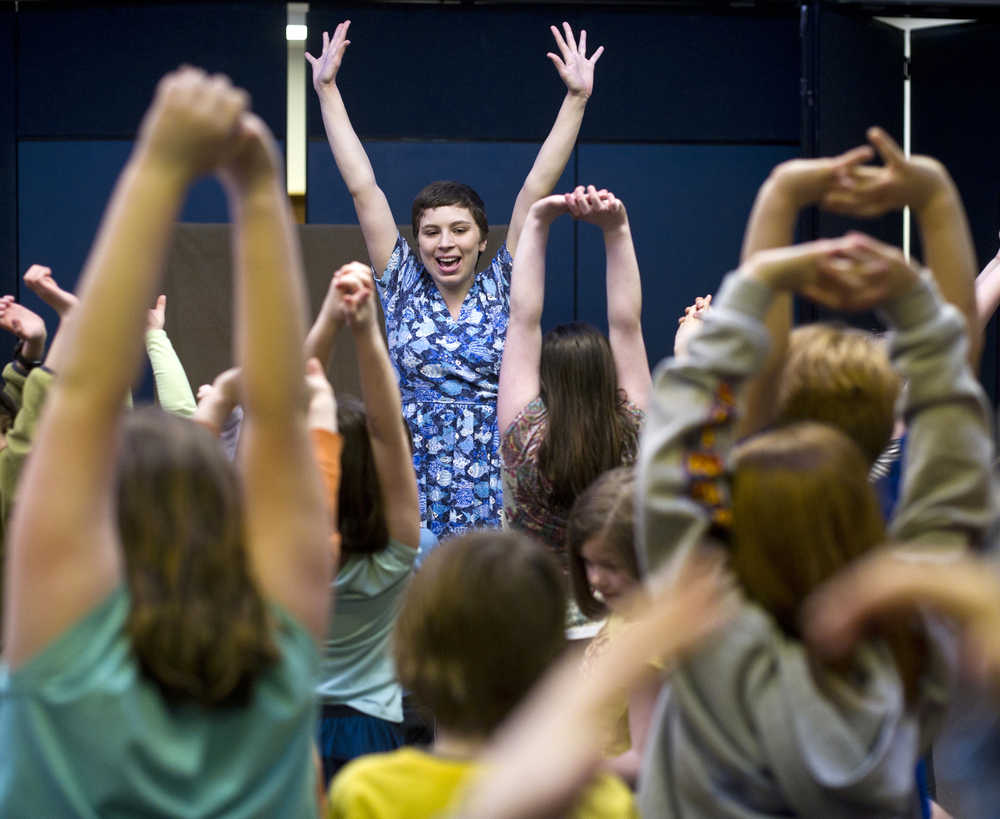“Raise your hand if you’ve ever heard of Perseverance Theatre,” Shona Osterhout said to a room of roughly 70 Montessori Borealis first through fourth graders.
Several hands went up, and even fewer when she asked how many of them have gone to the theater.
“The thing that I love about Perseverance Theatre is that today we’re coming to you,” Osterhout said.
Osterhout is Perseverance Theatre’s director of education. She also teaches a spring production class at the University of Alaska Southeast. For two weeks, Osterhout and three college actors toured all the elementary schools performing “The Fisherman and His Wife,” adapted from the Brothers Grimm. The play reached 730 students, including every second grader in the Juneau School District.
The UAS production class usually culminates in a play performed on campus geared for adults and the college community. This year, Osterhout said the class wanted to try something different.
Theater isn’t often accessible for elementary students, Osterhout said.
“When they get a little older, they can do field trips, but none of the little kids, especially lower primary, is really getting plays,” she said.
Osterhout is part of The Kennedy Center’s Any Given Child committee in Juneau, which seeks to provide an equitable arts experience for all students. While this particular production is not part of that initiative, Osterhout said it fits the mission.
She said bringing theater to young students teaches them how to be good audience members and exposes them to something they maybe haven’t seen before.
“I saw a play that came to my school when I was in third grade and that’s why I do theater,” Osterhout said. “The actors completely opened up a whole new world.”
Osterhout said the students also learn life lessons from the play. When a magical talking flounder grants a fisherman and his wife wishes, their simple lifestyle turns complicated and joyless.
Twenty-one-year-old UAS student Rochelle Smallwood played the flounder and the play’s narrator.
“It was really neat to teach lessons to children through the play,” she said.
Smallwood said the class looked through the second grade curriculum on the district website before selecting which play to perform.
“One of the things they do is they read folktales in second grade and they learn the moral behind it,” she said.
The production class chose a play that was interactive with the kids. When Smallwood described the fishing conditions, the audience’s arms became the waves. When UAS actor Maranda Clark, who played the fisherman’s wife, magically got chickens and ducks, the audience made the animal noises. When Richard Ringle, the fisherman, caught a crab on his fishing pole, he pulled one of the second graders out of the audience.
“It was just a fun way to teach,” Smallwood said. “They were all engaged. And for me, that’s how I would like to learn instead of a textbook or a lecture.”
Montessori Borealis teacher Lynnette McNutt took her first through fourth grade class to the play.
“I loved it. I thought it was a very dynamic,” she said.
McNutt has been working with her students on how to develop a narrative. After local artist Roblin Davis recently visited her class and did a dramatic narrative, McNutt’s students wrote their own mini stories and dramas that include a beginning, middle and end.
She said it was great to go from doing that exercise to watching “The Fisherman and His Wife.”
“From a teacher perspective it was nice to be able to have a real life, concrete example of something that you’ve been trying to develop in the classroom,” McNutt said.
She said her class later discussed the play and they’re still acting out their own mini narratives.
McNutt thanked Osterhout and the UAS actors for performing the play at Montessori Borealis.
“That’s nice for them to bring their gifts to us. That way we all can partake really easily versus trying to load everybody up in a bus and getting them down there. We’re grateful,” McNutt said. “Their level of energy was fantastic. It was just like going to Perseverance itself, so what a treat for the kids to be able to see.”
Besides participating in the play, it was clear the elementary students also understood what was going on. After the play, when Osterhout asked the audience what the moral was, many hands went up.
There were several interpretations of, “Be content with what you have.”
“You’re usually in the right spot to be perfectly happy,” one student said.
“Be careful with what you wish for,” said another.
And lastly, “You get what you get, and don’t throw a fit.”
• Contact reporter Lisa Phu at 523-2246 or lisa.phu@juneauempire.com.

